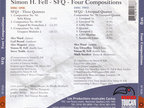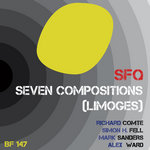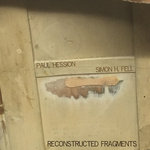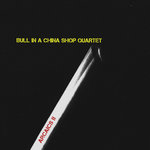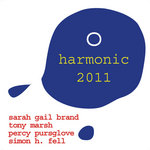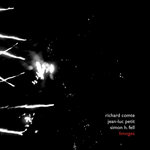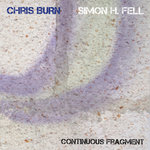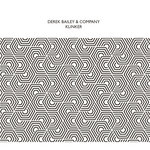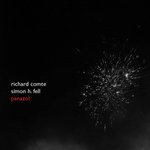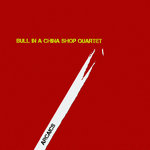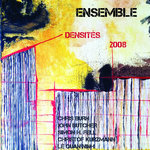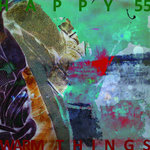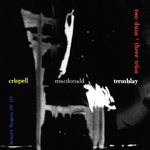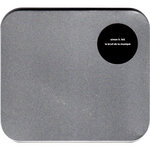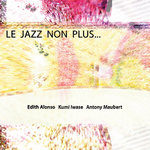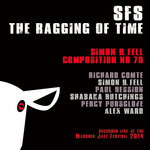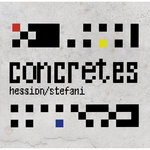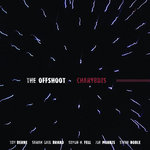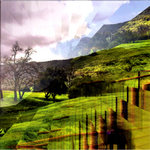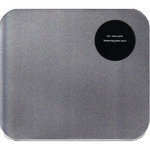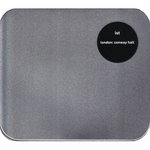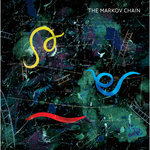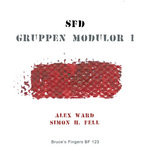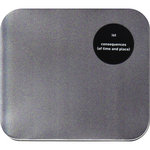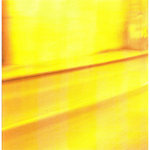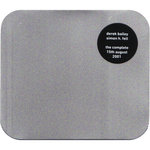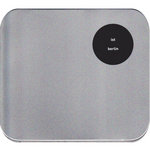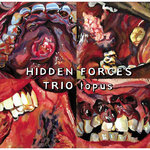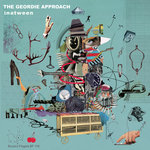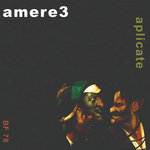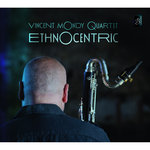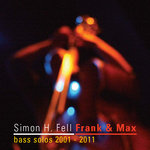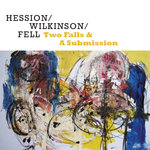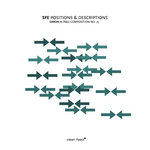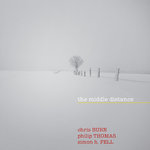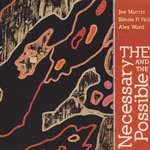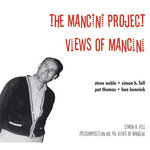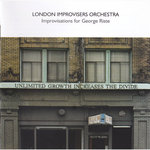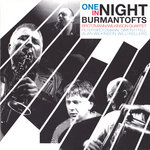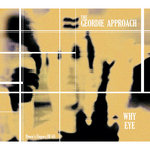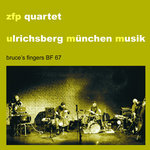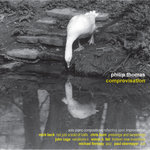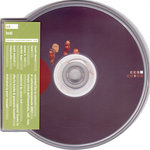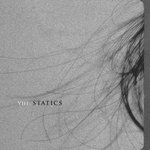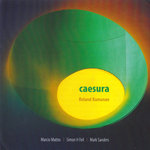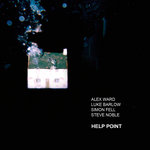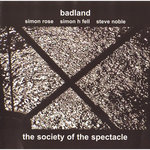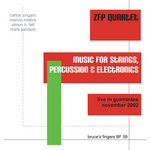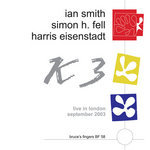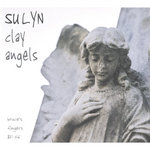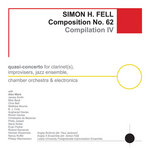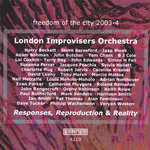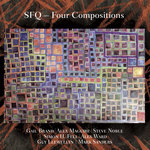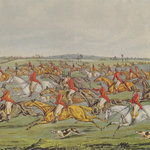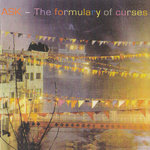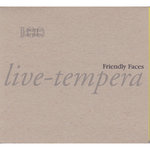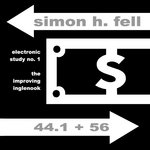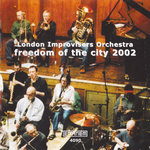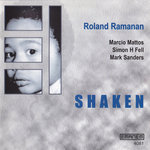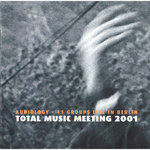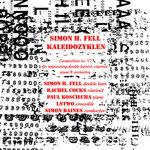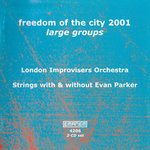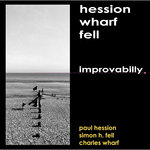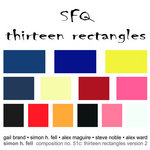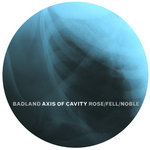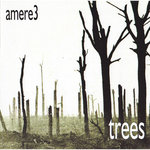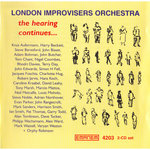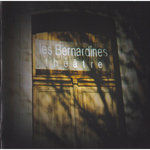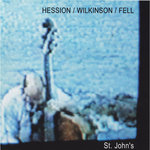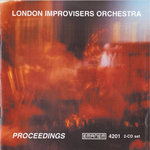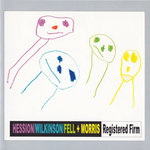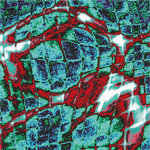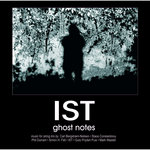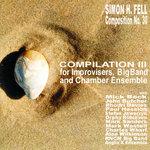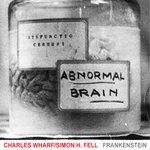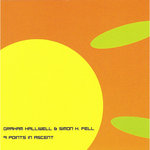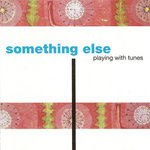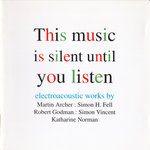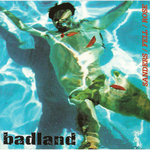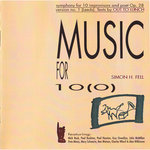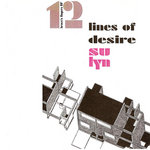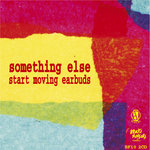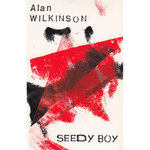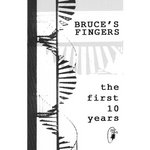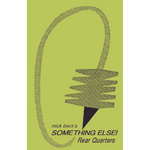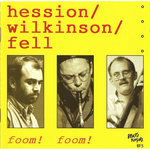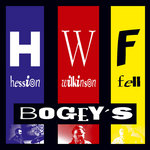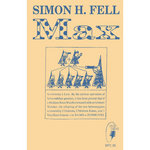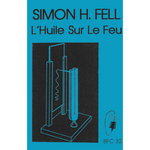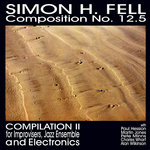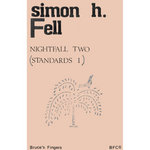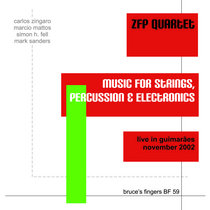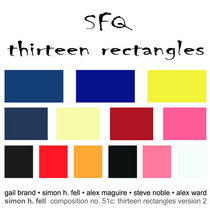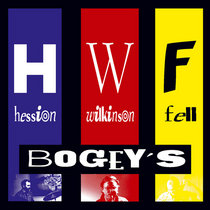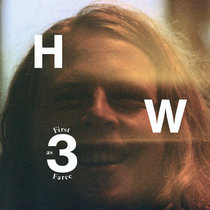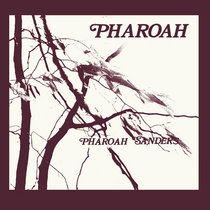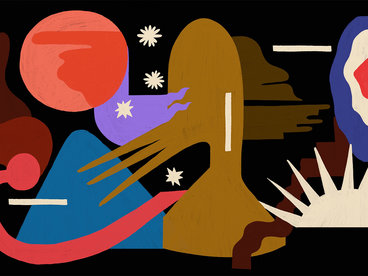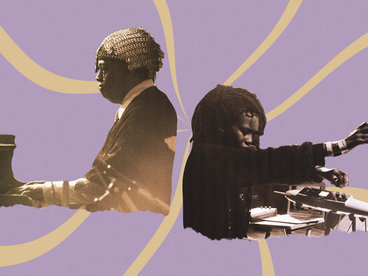
Four Compositions
by SFQ
-
2004 double CD release, in jewel box with 4-page booklet.
[Shipping prices are for airmail/priority delivery]ships out within 2 days€15.75 EUR or more
-
The same as the above, but without the jewel box.
If you have no need of the somewhat unloved and increasingly old-fashioned jewel box, we will send you the discs and all paper parts from the CD, without the plastic box.
The price is the same (we don't really need any more empty jewel boxes!), but it should offer you significant savings on shipping, especially if you order several discs and/or are outside Europe.ships out within 2 days€15.75 EUR or more
-
Subscription
Subscribe now to receive all the new music Bruce's Fingers creates, including 5 back-catalog releases, delivered instantly to you via the Bandcamp app for iOS and Android. You’ll also get access to subscriber-only exclusives. Learn more.Subscribe Now €20 EUR/year or more
1. |
|
about
The long-awaited second release from Simon Fell's SFQ project actually features two versions of the group, performing four substantial compositions for quartet or quintet. If you're interested in catching the latest developments in this fourth-stream synthesis of free improvisation, contemporary classical music and experimental jazz, this CD will be essential listening.
includes Simon Fell's Composition No. 50: Köln Klang, Composition No. 40.5d: Trapped By Formalism 2, Composition No. 62b: Gruppen Modulor 2 & Composition No. 70: Liverpool Quartet
includes Simon Fell's Composition No. 50: Köln Klang, Composition No. 40.5d: Trapped By Formalism 2, Composition No. 62b: Gruppen Modulor 2 & Composition No. 70: Liverpool Quartet
credits
released December 1, 2004
Alex Ward: clarinet
Guy Llewellyn: french horn
Gail Brand: trombone
Alex Maguire: piano
Simon H. Fell double bass
Steve Noble: drums
Mark Sanders: drums, electronics
2003-04 (91 mins.) in jewel box
© Red Toucan 2004
full track listing:
01. Composition No. 50: Köln Klang [09m43s]
02. Composition No. 40.5d: Trapped By Formalism 2 [12m29s]
03. Composition No. 62b: Gruppen Modulor 2 [24m12s]
04. Liverpool 1a [07m51s]
05. Liverpool 1b [04m58s]
06. GM2 Blues [07m21s]
07. Quartet [07m34s]
08. Liverpool 2 [06m32s]
09. GM3 Rhythm [04m55s]
10. Kandinsky Lines [04m53s]
SFQ discography: www.brucesfingers.co.uk/24
The scores of 'Trapped By Formalism 2' & 'Köln Klang' are available at www.brucesfingers.co.uk/catalogue/scores.htm
---------- selected press quotes ----------
"With this two-disc set of quintets and quartets, composer/bassist Simon Fell demonstrates that his brilliant eclecticism is as vibrant as ever. Several of Fell's influences are easy to discern. On SFQ1's Trapped By Formalism 2 one can hear early Stockhausen (think Kontakte) and middle period (pre-electric) George Russell quite clearly. The two strains - both certainly formal, but one "academic," the other "jazzy" - are braided together brilliantly. This may be "difficult" music, but it is also exuberant. Fell explicitly references both Russell and Stockhausen in his liner notes (he even calls one piece Gruppen Modulor 2), but the main point, of course, shouldn't really focus on from where but rather on where to, and the destinations here are uniformly worthy of intensive sightseeing. We should all by now recognize Fell's wonderful, if sometimes maniacal, counterpoint from his Composition No. 30 and his Thirteen Rectangles. One shudders at the rehearsal time that must have been expended on the SFQ1 pieces. Don't expect any high school ensembles to be tackling these soon. The gnarliest passages are all handled with ease by Fell's gang, however, as if they'd been memorized several weeks prior. While the free blowing here is limited, there are fine solos from all concerned on SFQ1 as well as on the subsequent disc. The two main differences between the three quintet pieces on disc one and the slightly later suite that constitutes Liverpool Quartet are that the Russell influence has almost disappeared, and somewhat less compositional direction is maintained on SFQ2. The quartet engages in considerably freer ensemble play, but the result is uniformly "classical," except in GM3 Rhythm where it's pretty straightforwardly Braxtonian. In any case, the walking bass passages seem to have mostly sauntered off (hand-in-hand with the necessity for 20-hour rehearsals) by the time SFQ2 was recorded. It shouldn't be inferred from this, however, that SFQ2 is haphazard. It also has a serious, though never solemn, feel. The Liverpool Quartet suite is generally more pointillistic than the earlier pieces (again excepting GM3 Rhythm), but doesn't seem more "spacious" for some reason. I find it a curious accident of history that in the "jazz" context, complete freedom has often seemed to result in a higher density of notes than more traditional compositions, while in the "classical" and ea-i contexts, complete freedom often produces many fewer notes per minute than something like, e.g., a Ferneyhough opus. I should point out, however, that, like Braxton, Fell is an absolute master of integrating composition and improvisation, so it's often quite difficult to guess which (if any) passages are entirely spontaneous creations. Finally, something that may (and, I think, should) also entice percussion fans is that both Sanders and Noble slam together crackling, electrifying solos - one on each disc." Walter Horn BAGATELLEN
"Bassist/composer Simon H. Fell is one of the leading lights of the British improv scene. Possessed with both striking ambition and a bounty of talent, Fell has been involved with a wealth of projects of all shapes and sizes, perhaps most significantly The London Improvisers Orchestra and the Hession/Wilkinson/Fell trio. Sadly, Fell continues to be somewhat under-recognized, despite his exceptional technical skills and compelling compositional aspirations. As for the latter, Fell's approach is formulated by the influence of a variety of sources, from "serious music" composers like Stravinsky, Stockhausen, and more recently, Harrison Birtwistle, to more "jazz" oriented forces like George Russell and Anthony Braxton, all in an attempt to "synthesize composition, improvisation and jazz". One of Fell's most satisfying projects is SFQ, his quintet and now, quartet, that focuses on his compositions. SFQ: Four Compositions holds exciting news, to say the least, that Fell has found a willing patron of his music in Michel Passaretti of Red Toucan. Disc one commences with the almost ten-minute classically-inspired piece Composition No. 50: Köln Klang, which begins with a hair-raising percussive stroke from both Maguire and Noble that appears periodically amidst Fell's almost silent arco work and Brand's glorious fluttering trombone. Up next is Composition No.40.5d: Trapped By Formalism, an investigation of the "more formalistic tendencies of post-war European modernism", which initially commences as a connect-the-dots venture before the quintet breaks into eight bars of swing time (reminiscent of the Thirteen Rectangles theme). The piece flourishes on its constant terrain shifts, though its crux is the interplay between Ward, Brand, and Maguire against the bristling energy from Fell and Noble, who are remarkable rhythm partners. Finally, the almost 25 minute Composition No. 62b: Grupen Modulor 2 concludes the session with a thrilling ride that combines a series of thematic material, pointillistic vigor, and spaciousness, mixed between five subsections. While Fell and Noble instigate the piece with their hard-driving interchange, Ward's wiry clarinet work soon takes the spotlight, followed later by Brand's airy sound collages and eventually, a midtempo swing vamp amidst the written horn charts. Maguire's strident piano lines race by blissfully, leading to Fell's emotive bass work before the piece smolders away to a hushed silence. The second disc consists of a single quartet performance of Fell's seven-part piece Composition No. 70, with Ward, French hornist Guy Llewellyn, and the remarkable percussionist Mark Sanders. As with the other SFQ pieces, this composition is just as demanding, with shifting schematics and a heightened sense of interplay among the musicians that call for them to improvise quite a bit more than the previous disc's tightly-scripted charts (though to be fair, it is quite difficult to tell the difference without looking at the charts). The first section, Liverpool 1a, commences with an introspective theme before Ward's dramatic dashes stir amidst Sanders' rousing undulations and, eventually, the extended lines from Fell's arco and Llewellyn's gentle burrs. Liverpool 1b is an immediately forceful endeavor, with the swirling horns juxtaposed against Fell and Sanders' bustle before visiting more abstract realms. For those looking for some solid work in the Braxtonian vein, go no further than GM2 Blues with its opening thematic discourse leading to charged interplay, particularly from Llewellyn who works particularly well when coaxed by Fell's rubbery arco and Sanders' nimble brushwork. The piece later turns into a meditative journey, with Ward becoming peaceful amidst Sanders clattering percussion. The freely improvised Quartet is up next, a ghostly journey with an innate sense of urgency, which folds into Liverpool 2, a feature for Sanders' exquisite cadences, with the rest of the group following his lead. The Braxton-tinged GM3 Rhythm and its thematic signals appear again, with the horn's clipped tones and Ward's spiky clarinet maneuvers. Finally, the suite concludes with Kandinsky Lines, a feature for Fell's adroit arco tones. Four Compositions is another in a series of not-to-be-missed records from the courageous Fell. Utilizing his broad influences, Fell has crafted these statements into a singular vision that is both a challenge and delight for listener and performer alike. If you miss this one, you are missing out big time." Jay Collins ONE FINAL NOTE
"Two unreleased albums by Britain's great present day composer brought together by a distinguished Montreal label. Having proved his mettle both as an improvisor and a composer for orchestral forces (the astonishing Compilation series), in 2003/4 Fell wrote for small groups. The way he focuses on a particular project, finishes it, and then releases excellent recordings of the work is exceptionally satisfying. Composition No. 50: Köln Klang hinges on the contrast between a magnificent cluster from Maguire-piano harmonics that will test your system and intimiste (obscene?) improv from the others. The quartet (Composition No. 70: Liverpool Quartet) pursues the close dialogue between compositional blocks and improvisation pioneered by Anthony Braxton, but is here realised with a finesse, commitment and undimmed personality which put Braxton's recent student bands to shame. Indeed, some of Ward's quick turns - wild humour and fierce speculation Chinese-puzzled into inextricable knots - will have you gawping. Not just important music but a mighty hinge for the future of jazz." Ben Watson HIFI NEWS
"Though both discs of this set are credited to SFQ, they are the work of two very different ensembles. Disc one, recorded in 2003, contains three pieces performed by the Thirteen Rectangles band: clarinettist Alex Ward, trombonist Gail Brand, pianist Alex Maguire and drummer Steve Noble, in addition to Fell himself on bass. Köln Klang is a rather inscrutable composition "inspired by and partly depicting the soundworld of a hotel bedroom in Köln." (My impression is that the soundworld in question involved church bells and snoring.) Trapped by Formalism 2 is a collapsing-wedding-cake of a piece bookended by a barrage of fragments and an aphoristic piano coda. Gruppen Modulor 2 is the longest of the three, at 24 minutes, and falls into five distinct parts: a frenzied introduction, a clangy drum feature overlaid by stiff Braxtonian horns, a subdued trombone/clarinet/piano trio, a somewhat ungainly freebop "Blues" (sic: it doesn't sound like a blues at all) that prompts a stunning solo from Maguire, and a cryptic, drawn-out coda. On disc two the band now consists of Ward, Fell, French-horn player Guy Llewellyn, and drummer Mark Sanders. Though Fell says the music is "less jazz orientated", the open textures and seamless knitting-together of improvisation and composition make it more familiar territory for the jazz/improv fan than disc 1. As usual with Fell, there's nothing obvious about how it's put together. In addition to the three Liverpool pieces (numbered 1a, 1b and 2) there are two cut-ins from the Gruppen Modulor series (a tempestuous free-jazz reading of GM2 Blues and the Braxton-goes-samba GM3 Rhythm), a whistling-wind Quartet that appears to be entirely improvised and a stripped-down coda built around Fell's arco bass, Kandinsky Lines. Llewellyn's obviously a player to watch: he's a powerhouse on an instrument usually considered a tough go for improvised music, and his work on GM2 Blues is little short of astonishing. Sanders' slippery-eel drumming makes a huge difference to the band sound: with his acute ear for colour he makes the air come alive with subtle washes of overtones. But it's Alex Ward who pulls off the disc's biggest coup on Liverpool 1a with a clarinet solo like a half-pierced dream, tender and self-consuming, full of charged, quick-evaporating insights. If you want a single reason to get the album, Ward's solo is enough: it's simply one of the best improvised statements I've heard in recent years. As for the rest of Four Compositions, I'm sure Fell would prefer I called it "frigid" and "intractable", but I'm afraid I'll just have to settle for "outstanding" and - horror of horrors - "highly enjoyable"." Nate Dorward PARIS TRANSATLANTIC
"British composer Simon H. Fell has documented his long form orchestral works to much critical acclaim in the recent past. In an interview with the Austrian magazine JazzLive, from 1998, Fell mentioned having begun work on a series of smaller quartet and quintet pieces. Deriving his inspiration from the classic Braxton and Coltrane quartets, Fell demonstrates a keen understanding of the myriad virtues of those quintessential ensembles. These elaborate small group recordings will undoubtedly win him the same sort of critical acclaim as his recent large scale works. An inspired combination of the likes of Boulez, Schoenberg, and Braxton, as well as Stockhausen and George Russell's pre-electric work, this hybrid music is part of a small but fertile tradition. Episodic in the extreme, modulating between acerbic Freebop and sinuous chamber music, these long form compositions require more than a casual listen. There is a compositional complexity to these pieces that is more commonly found in the contemporary classical world than the Jazz idiom. Composition No. 40.5d: Trapped By Formalism quickly segues into a sprightly walking bass line, complete with knotty intertwined horn lines and pulse-driven trap set work. Composition No. 62b: Gruppen Modulor 2 arrives full-blown, crashing out of the gate with bristling counterpoint and a driving rhythm, building to sinuous unison head melodies and more incendiary interplay, leavened with the occasional solo cadenza. Composition No. 70: Liverpool Quartet occupies the entire duration of the second disc, and it is as circuitous a journey as the first disc's compositions. Opening with bowed bass and sporadic angular unison horn lines, the piece begins like a methodical chamber quartet recital. The serenity doesn't last however as an agitated free form collective improvisation soon interrupts the orderly proceedings only to mutate again into a brashly swinging angular Freebop line. By the halfway mark, the ensemble has navigated its way back down into barely audible pointillism. And so it goes, back and forth, the entire ensemble shifting on a dime between stylistic extremes. Featuring gnarly counterpoint, telepathic call and response sections, collective improvisation, dynamic tempo shifts and solo cadenzas, this is all-encompassing music, bridging the tenuous divide between the composed and improvised. With an ensemble so perfectly in tune with the composer's conception, one would be hard pressed to distinguish the improvised from the composed on these pieces. For those looking for the future of creative improvised music, Four Compositions is a must-have album." Troy Collins CADENCE
to see full press quotes/reviews for this album, visit www.brucesfingers.co.uk/catalogue/rt9326reviews.htm
Alex Ward: clarinet
Guy Llewellyn: french horn
Gail Brand: trombone
Alex Maguire: piano
Simon H. Fell double bass
Steve Noble: drums
Mark Sanders: drums, electronics
2003-04 (91 mins.) in jewel box
© Red Toucan 2004
full track listing:
01. Composition No. 50: Köln Klang [09m43s]
02. Composition No. 40.5d: Trapped By Formalism 2 [12m29s]
03. Composition No. 62b: Gruppen Modulor 2 [24m12s]
04. Liverpool 1a [07m51s]
05. Liverpool 1b [04m58s]
06. GM2 Blues [07m21s]
07. Quartet [07m34s]
08. Liverpool 2 [06m32s]
09. GM3 Rhythm [04m55s]
10. Kandinsky Lines [04m53s]
SFQ discography: www.brucesfingers.co.uk/24
The scores of 'Trapped By Formalism 2' & 'Köln Klang' are available at www.brucesfingers.co.uk/catalogue/scores.htm
---------- selected press quotes ----------
"With this two-disc set of quintets and quartets, composer/bassist Simon Fell demonstrates that his brilliant eclecticism is as vibrant as ever. Several of Fell's influences are easy to discern. On SFQ1's Trapped By Formalism 2 one can hear early Stockhausen (think Kontakte) and middle period (pre-electric) George Russell quite clearly. The two strains - both certainly formal, but one "academic," the other "jazzy" - are braided together brilliantly. This may be "difficult" music, but it is also exuberant. Fell explicitly references both Russell and Stockhausen in his liner notes (he even calls one piece Gruppen Modulor 2), but the main point, of course, shouldn't really focus on from where but rather on where to, and the destinations here are uniformly worthy of intensive sightseeing. We should all by now recognize Fell's wonderful, if sometimes maniacal, counterpoint from his Composition No. 30 and his Thirteen Rectangles. One shudders at the rehearsal time that must have been expended on the SFQ1 pieces. Don't expect any high school ensembles to be tackling these soon. The gnarliest passages are all handled with ease by Fell's gang, however, as if they'd been memorized several weeks prior. While the free blowing here is limited, there are fine solos from all concerned on SFQ1 as well as on the subsequent disc. The two main differences between the three quintet pieces on disc one and the slightly later suite that constitutes Liverpool Quartet are that the Russell influence has almost disappeared, and somewhat less compositional direction is maintained on SFQ2. The quartet engages in considerably freer ensemble play, but the result is uniformly "classical," except in GM3 Rhythm where it's pretty straightforwardly Braxtonian. In any case, the walking bass passages seem to have mostly sauntered off (hand-in-hand with the necessity for 20-hour rehearsals) by the time SFQ2 was recorded. It shouldn't be inferred from this, however, that SFQ2 is haphazard. It also has a serious, though never solemn, feel. The Liverpool Quartet suite is generally more pointillistic than the earlier pieces (again excepting GM3 Rhythm), but doesn't seem more "spacious" for some reason. I find it a curious accident of history that in the "jazz" context, complete freedom has often seemed to result in a higher density of notes than more traditional compositions, while in the "classical" and ea-i contexts, complete freedom often produces many fewer notes per minute than something like, e.g., a Ferneyhough opus. I should point out, however, that, like Braxton, Fell is an absolute master of integrating composition and improvisation, so it's often quite difficult to guess which (if any) passages are entirely spontaneous creations. Finally, something that may (and, I think, should) also entice percussion fans is that both Sanders and Noble slam together crackling, electrifying solos - one on each disc." Walter Horn BAGATELLEN
"Bassist/composer Simon H. Fell is one of the leading lights of the British improv scene. Possessed with both striking ambition and a bounty of talent, Fell has been involved with a wealth of projects of all shapes and sizes, perhaps most significantly The London Improvisers Orchestra and the Hession/Wilkinson/Fell trio. Sadly, Fell continues to be somewhat under-recognized, despite his exceptional technical skills and compelling compositional aspirations. As for the latter, Fell's approach is formulated by the influence of a variety of sources, from "serious music" composers like Stravinsky, Stockhausen, and more recently, Harrison Birtwistle, to more "jazz" oriented forces like George Russell and Anthony Braxton, all in an attempt to "synthesize composition, improvisation and jazz". One of Fell's most satisfying projects is SFQ, his quintet and now, quartet, that focuses on his compositions. SFQ: Four Compositions holds exciting news, to say the least, that Fell has found a willing patron of his music in Michel Passaretti of Red Toucan. Disc one commences with the almost ten-minute classically-inspired piece Composition No. 50: Köln Klang, which begins with a hair-raising percussive stroke from both Maguire and Noble that appears periodically amidst Fell's almost silent arco work and Brand's glorious fluttering trombone. Up next is Composition No.40.5d: Trapped By Formalism, an investigation of the "more formalistic tendencies of post-war European modernism", which initially commences as a connect-the-dots venture before the quintet breaks into eight bars of swing time (reminiscent of the Thirteen Rectangles theme). The piece flourishes on its constant terrain shifts, though its crux is the interplay between Ward, Brand, and Maguire against the bristling energy from Fell and Noble, who are remarkable rhythm partners. Finally, the almost 25 minute Composition No. 62b: Grupen Modulor 2 concludes the session with a thrilling ride that combines a series of thematic material, pointillistic vigor, and spaciousness, mixed between five subsections. While Fell and Noble instigate the piece with their hard-driving interchange, Ward's wiry clarinet work soon takes the spotlight, followed later by Brand's airy sound collages and eventually, a midtempo swing vamp amidst the written horn charts. Maguire's strident piano lines race by blissfully, leading to Fell's emotive bass work before the piece smolders away to a hushed silence. The second disc consists of a single quartet performance of Fell's seven-part piece Composition No. 70, with Ward, French hornist Guy Llewellyn, and the remarkable percussionist Mark Sanders. As with the other SFQ pieces, this composition is just as demanding, with shifting schematics and a heightened sense of interplay among the musicians that call for them to improvise quite a bit more than the previous disc's tightly-scripted charts (though to be fair, it is quite difficult to tell the difference without looking at the charts). The first section, Liverpool 1a, commences with an introspective theme before Ward's dramatic dashes stir amidst Sanders' rousing undulations and, eventually, the extended lines from Fell's arco and Llewellyn's gentle burrs. Liverpool 1b is an immediately forceful endeavor, with the swirling horns juxtaposed against Fell and Sanders' bustle before visiting more abstract realms. For those looking for some solid work in the Braxtonian vein, go no further than GM2 Blues with its opening thematic discourse leading to charged interplay, particularly from Llewellyn who works particularly well when coaxed by Fell's rubbery arco and Sanders' nimble brushwork. The piece later turns into a meditative journey, with Ward becoming peaceful amidst Sanders clattering percussion. The freely improvised Quartet is up next, a ghostly journey with an innate sense of urgency, which folds into Liverpool 2, a feature for Sanders' exquisite cadences, with the rest of the group following his lead. The Braxton-tinged GM3 Rhythm and its thematic signals appear again, with the horn's clipped tones and Ward's spiky clarinet maneuvers. Finally, the suite concludes with Kandinsky Lines, a feature for Fell's adroit arco tones. Four Compositions is another in a series of not-to-be-missed records from the courageous Fell. Utilizing his broad influences, Fell has crafted these statements into a singular vision that is both a challenge and delight for listener and performer alike. If you miss this one, you are missing out big time." Jay Collins ONE FINAL NOTE
"Two unreleased albums by Britain's great present day composer brought together by a distinguished Montreal label. Having proved his mettle both as an improvisor and a composer for orchestral forces (the astonishing Compilation series), in 2003/4 Fell wrote for small groups. The way he focuses on a particular project, finishes it, and then releases excellent recordings of the work is exceptionally satisfying. Composition No. 50: Köln Klang hinges on the contrast between a magnificent cluster from Maguire-piano harmonics that will test your system and intimiste (obscene?) improv from the others. The quartet (Composition No. 70: Liverpool Quartet) pursues the close dialogue between compositional blocks and improvisation pioneered by Anthony Braxton, but is here realised with a finesse, commitment and undimmed personality which put Braxton's recent student bands to shame. Indeed, some of Ward's quick turns - wild humour and fierce speculation Chinese-puzzled into inextricable knots - will have you gawping. Not just important music but a mighty hinge for the future of jazz." Ben Watson HIFI NEWS
"Though both discs of this set are credited to SFQ, they are the work of two very different ensembles. Disc one, recorded in 2003, contains three pieces performed by the Thirteen Rectangles band: clarinettist Alex Ward, trombonist Gail Brand, pianist Alex Maguire and drummer Steve Noble, in addition to Fell himself on bass. Köln Klang is a rather inscrutable composition "inspired by and partly depicting the soundworld of a hotel bedroom in Köln." (My impression is that the soundworld in question involved church bells and snoring.) Trapped by Formalism 2 is a collapsing-wedding-cake of a piece bookended by a barrage of fragments and an aphoristic piano coda. Gruppen Modulor 2 is the longest of the three, at 24 minutes, and falls into five distinct parts: a frenzied introduction, a clangy drum feature overlaid by stiff Braxtonian horns, a subdued trombone/clarinet/piano trio, a somewhat ungainly freebop "Blues" (sic: it doesn't sound like a blues at all) that prompts a stunning solo from Maguire, and a cryptic, drawn-out coda. On disc two the band now consists of Ward, Fell, French-horn player Guy Llewellyn, and drummer Mark Sanders. Though Fell says the music is "less jazz orientated", the open textures and seamless knitting-together of improvisation and composition make it more familiar territory for the jazz/improv fan than disc 1. As usual with Fell, there's nothing obvious about how it's put together. In addition to the three Liverpool pieces (numbered 1a, 1b and 2) there are two cut-ins from the Gruppen Modulor series (a tempestuous free-jazz reading of GM2 Blues and the Braxton-goes-samba GM3 Rhythm), a whistling-wind Quartet that appears to be entirely improvised and a stripped-down coda built around Fell's arco bass, Kandinsky Lines. Llewellyn's obviously a player to watch: he's a powerhouse on an instrument usually considered a tough go for improvised music, and his work on GM2 Blues is little short of astonishing. Sanders' slippery-eel drumming makes a huge difference to the band sound: with his acute ear for colour he makes the air come alive with subtle washes of overtones. But it's Alex Ward who pulls off the disc's biggest coup on Liverpool 1a with a clarinet solo like a half-pierced dream, tender and self-consuming, full of charged, quick-evaporating insights. If you want a single reason to get the album, Ward's solo is enough: it's simply one of the best improvised statements I've heard in recent years. As for the rest of Four Compositions, I'm sure Fell would prefer I called it "frigid" and "intractable", but I'm afraid I'll just have to settle for "outstanding" and - horror of horrors - "highly enjoyable"." Nate Dorward PARIS TRANSATLANTIC
"British composer Simon H. Fell has documented his long form orchestral works to much critical acclaim in the recent past. In an interview with the Austrian magazine JazzLive, from 1998, Fell mentioned having begun work on a series of smaller quartet and quintet pieces. Deriving his inspiration from the classic Braxton and Coltrane quartets, Fell demonstrates a keen understanding of the myriad virtues of those quintessential ensembles. These elaborate small group recordings will undoubtedly win him the same sort of critical acclaim as his recent large scale works. An inspired combination of the likes of Boulez, Schoenberg, and Braxton, as well as Stockhausen and George Russell's pre-electric work, this hybrid music is part of a small but fertile tradition. Episodic in the extreme, modulating between acerbic Freebop and sinuous chamber music, these long form compositions require more than a casual listen. There is a compositional complexity to these pieces that is more commonly found in the contemporary classical world than the Jazz idiom. Composition No. 40.5d: Trapped By Formalism quickly segues into a sprightly walking bass line, complete with knotty intertwined horn lines and pulse-driven trap set work. Composition No. 62b: Gruppen Modulor 2 arrives full-blown, crashing out of the gate with bristling counterpoint and a driving rhythm, building to sinuous unison head melodies and more incendiary interplay, leavened with the occasional solo cadenza. Composition No. 70: Liverpool Quartet occupies the entire duration of the second disc, and it is as circuitous a journey as the first disc's compositions. Opening with bowed bass and sporadic angular unison horn lines, the piece begins like a methodical chamber quartet recital. The serenity doesn't last however as an agitated free form collective improvisation soon interrupts the orderly proceedings only to mutate again into a brashly swinging angular Freebop line. By the halfway mark, the ensemble has navigated its way back down into barely audible pointillism. And so it goes, back and forth, the entire ensemble shifting on a dime between stylistic extremes. Featuring gnarly counterpoint, telepathic call and response sections, collective improvisation, dynamic tempo shifts and solo cadenzas, this is all-encompassing music, bridging the tenuous divide between the composed and improvised. With an ensemble so perfectly in tune with the composer's conception, one would be hard pressed to distinguish the improvised from the composed on these pieces. For those looking for the future of creative improvised music, Four Compositions is a must-have album." Troy Collins CADENCE
to see full press quotes/reviews for this album, visit www.brucesfingers.co.uk/catalogue/rt9326reviews.htm
license
all rights reserved
tags
about
Bruce's Fingers Saint Dizier Leyrenne, France
Bruce's Fingers is a record label founded in 1983 by bassist, composer & improviser Simon H. Fell.
The label's
publications (which also include books and scores) are centred around free / contemporary jazz, improvised music & contemporary / experimental composition.
Initially focussed on Fell's own work, the BF project has since expanded to include many other things besides...
... more
discography
-
Mar 2020
-
Mar 2020
-
Mar 2020
-
Feb 2020
-
Mar 2019
-
Jan 2019
-
Oct 2018
-
Sep 2018
-
Mar 2018
-
Mar 2018
-
Dec 2017
-
Nov 2017
-
Dec 2016
-
Dec 2016
-
Dec 2016
-
Dec 2016
-
Oct 2015
-
Oct 2015
-
Oct 2015
-
Aug 2015
-
Aug 2015
-
Mar 2015
-
Nov 2014
-
Oct 2014
-
Sep 2014
-
Jul 2014
-
Feb 2014
-
Oct 2013
-
Sep 2013
-
Jun 2013
-
Jun 2013
-
Jan 2013
-
Jan 2013
-
Aug 2012
-
Jan 2012
-
Oct 2011
-
Oct 2011
-
Aug 2011
-
Dec 2009
-
Jul 2009
-
Dec 2008
-
Oct 2008
-
Dec 2007
-
Jul 2007
-
Jul 2007
-
Apr 2007
-
Nov 2006
-
May 2006
-
Mar 2006
-
Oct 2005
-
Sep 2005
-
Sep 2005
-
Aug 2005
-
Jul 2005
-
Jul 2005
-
Jul 2005
-
Dec 2004
-
Jul 2004
-
Jan 2004
-
Dec 2003
-
Jul 2003
-
Jun 2003
-
Dec 2002
-
Oct 2002
-
Jun 2002
-
Jun 2002
-
Jun 2002
-
May 2002
-
May 2002
-
Oct 2001
-
Aug 2001
-
Jun 2001
-
Sep 2000
-
Sep 2000
-
Mar 2000
-
Sep 1999
-
Dec 1998
-
Dec 1998
-
Nov 1998
-
Jul 1998
-
May 1998
-
Apr 1998
-
Mar 1997
-
Dec 1996
-
May 1996
-
Aug 1995
-
Jul 1995
-
Nov 1994
-
Aug 1994
-
Apr 1993
-
Nov 1992
-
Aug 1992
-
Sep 1991
-
Aug 1991
-
Jan 1991
-
Mar 1990
-
Jul 1986
contact / help
Bruce's Fingers recommends:
If you like Four Compositions, you may also like:



